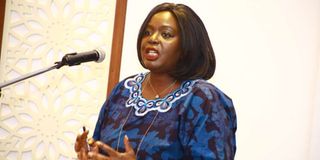Foreign Affairs CS calls for girls' protection as schools reopen

Foreign Affairs CS Raychelle Omamo called on he 54-member Commonwealth group to develop, implement workable solutions that prioritise the plight of women and girls.
What you need to know:
- Foreign Affairs CS Raychelle Omamo is calling for more measures for the protection of girls as schools reopen around the world, in the wake of Covid-19.
- Calls on on the 54-member Commonwealth group to develop and implement workable solutions that prioritise the plight of women and girls.
- Asked the secretariat, based in London, to develop a monitoring index mechanism to track, assess how girls are returning to school in various countries in the post covid-19 era.
Foreign Affairs Cabinet Secretary Raychelle Omamo is calling for more measures for the protection of girls as schools reopen around the world, in the wake of Covid-19.
In a speech to representatives of the Commonwealth members on Wednesday, Ms Omamo said the pandemic has exposed more dangers to girls such as child marriages and pregnancies that have also led to unsafe abortions.
She called on the 54-member Commonwealth group, often known as the 'Club', to develop and implement workable solutions that prioritise the plight of women and girls who she argued have been disproportionately affected by Covid-19 through increased gender-based violence (GBV).
"As you are all aware, school-age girls have had to contend with early pregnancies, unsafe abortions and child marriages among other physical and sexual atrocities during the pandemic," Omamo told the audience in a virtual meeting.
Remain in school
"Kenya urges all Commonwealth members to urgently institutionalise concrete measures that will ensure that girls return and remain in school safely," she added.
The Commonwealth group includes the United Kingdom and most of its former colonies, as well as Rwanda and Mozambique (who were Belgian and Portuguese colonies respectively), connected through cultural and linguistic ties.
Most of its members have recently began reopening their economies, albeit with stringent protocol on safety against the pandemic. But it turns out, Ms Omamo argued, the spread of the virus has also exposed serious challenges in protecting girls.
In Kenya, President Kenyatta in July ordered an investigation into claims hundreds of young girls had been impregnated as schools stayed shut down during the lock down.
Coronavirus restrictions
He also a probe into rising reports of violence against women and girls - including rape, domestic violence, female genital mutilation (FGM) and child marriage as a result of coronavirus restrictions.
Schools have since reopened, but only to candidate classes as authorities weigh the situation.
Ms Omamo asked the secretariat, based in London, to develop a tool kit or monitoring index mechanism to track and assess how girls are returning to school in various countries in the post covid-19 era.
"We must champion for a safe and secure learning environment from which other member States can learn best practices, as they strive to achieve SDG5 on gender equality. Protecting our girls while in school is our duty. This would be a practical contribution that I believe we can all support."
Frontline response
Although there are no official statistics on the number of cases of violence against women and girls in Kenya, organisation like Health Assistance Kenya (HAK1195) a frontline response services recorded rise in the number of cases from March.
The President further said he was concerned by increasing tensions within the home, the rise in gender-based violence cases, mental health issues and the escalated teenage pregnancy numbers.
"We must always remember that the family is a projection of the state. If the family is under attack, the state is under attack. If the family is weak, the country is weak," President Kenyatta said then.
School closures
He directed the National Crime Research Centre to move swiftly and investigate increasing cases of gender-based violence and teenage pregnancy, and prepare an advisory to security agencies on remedial action within 30 days and start immediate prosecution of violators.
A report published by researchers at the University of Birmingham in July, found that school closures may have made younger children in Kenya particularly, vulnerable to offences committed by "non-strangers", such as neighbours, and during the daytime. It added that the average age of a survivor of offences committed by "non- strangers" is now 12 years old, compared to a national average of 16 before the pandemic.




